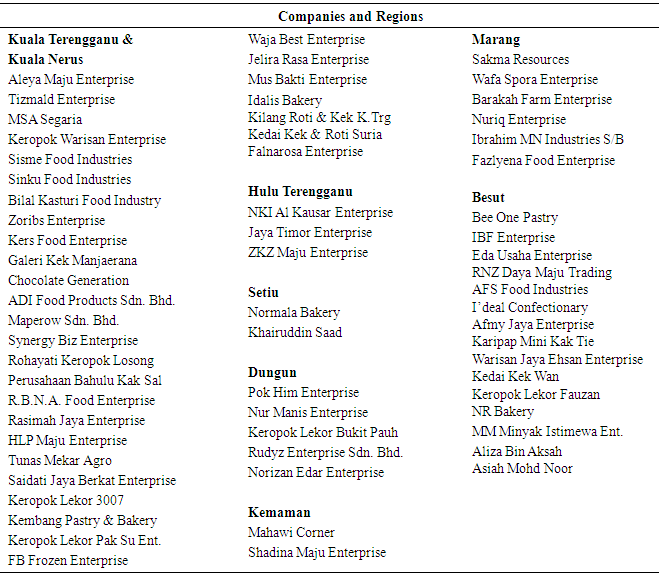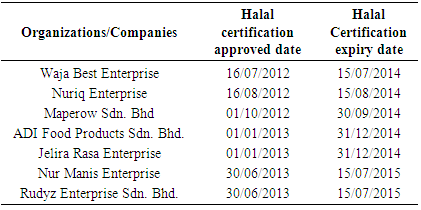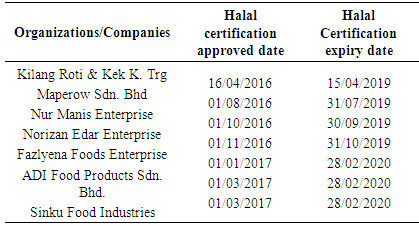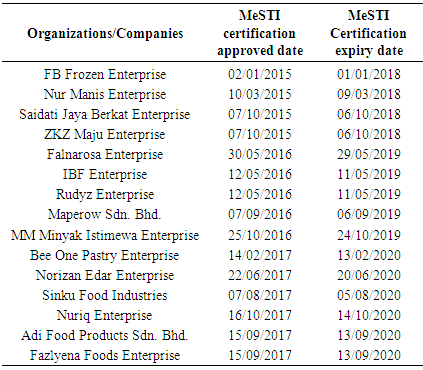-
Paper Information
- Paper Submission
-
Journal Information
- About This Journal
- Editorial Board
- Current Issue
- Archive
- Author Guidelines
- Contact Us
American Journal of Economics
p-ISSN: 2166-4951 e-ISSN: 2166-496X
2019; 9(3): 87-92
doi:10.5923/j.economics.20190903.01

Halal Certification of Terengganu Food Industry
Roslan Arshad, Kamarul ‘Ain Mustafa, Che Abdullah Abu Bakar, Wan Musa Wan Muda, Nur Syamimi Ramlan, Tengku Nor Farhana T. Azmi, Nur Adila Basari, Aimi Nadiah Yusoff, Halimatu Sa’adiah Ab Wahab, Mohd Ikhsan Khalid, Wan Anwar Fahmi Wan Mohamad, Noor Aida Aini Nawawi, Zainal Abidin Ramli
School of Food Industry, Faculty of Bioresources and Food Industry, Universiti Sultan Zainal Abidin, Terengganu, Malaysia
Correspondence to: Roslan Arshad, School of Food Industry, Faculty of Bioresources and Food Industry, Universiti Sultan Zainal Abidin, Terengganu, Malaysia.
| Email: |  |
Copyright © 2019 The Author(s). Published by Scientific & Academic Publishing.
This work is licensed under the Creative Commons Attribution International License (CC BY).
http://creativecommons.org/licenses/by/4.0/

This community project was initiated to guide small and medium scale entrepreneurs (SMEs) in Terengganu to achieve Halal certification for their products from the Department of Islamic Development Malaysia (JAKIM). The SMEs involved in this program were identified by our community partner, Terengganu Entrepreneur Development Foundation (YPU) and were shortlisted based on their potential to achieve JAKIM halal certification. Short courses, talks and workshops were organized to expose the entrepreneurs to the rules and regulations pertaining to Halal certification and to develop the manual for Safe Food Industry Responsibility (MeSTI) Certification Scheme. The initial steps involved auditing of premises to determine their compliance to JAKIM’s Halal certification requirements. After a report containing recommendations for improvements to the premise was given to the entrepreneurs they were then given approximately a month to meet the requirements for JAKIM’s Halal certification and the Food Safety Assurance Program (PJKM) required by the Ministry of Health Malaysia. Following the second auditing, after the entrepreneurs were ready to go forward with the certification, the group assisted the entrepreneurs to submit the Halal certification application online to the Council of Islamic Religion and Malay Customs Terengganu (MAIDAM) and Terengganu State Health Department (JKNT) for the next reviewing process. A total of 65 out of 192 or 33.9% of the entrepreneurs listed by YPU were short listed and audited. Only 15 premises obtained MeSTI certification. Meanwhile, seven premises have already succeeded in getting the Halal certification from JAKIM (2012 – 2015) and seven premises (2016 – 2019) still valid for their Halal certificates after verification. Other premises are still under the guidance for obtaining Halal and MeSTI certifications.
Keywords: SMEs, Halal Certification, JAKIM, MeSTI, PJKM, Malaysia
Cite this paper: Roslan Arshad, Kamarul ‘Ain Mustafa, Che Abdullah Abu Bakar, Wan Musa Wan Muda, Nur Syamimi Ramlan, Tengku Nor Farhana T. Azmi, Nur Adila Basari, Aimi Nadiah Yusoff, Halimatu Sa’adiah Ab Wahab, Mohd Ikhsan Khalid, Wan Anwar Fahmi Wan Mohamad, Noor Aida Aini Nawawi, Zainal Abidin Ramli, Halal Certification of Terengganu Food Industry, American Journal of Economics, Vol. 9 No. 3, 2019, pp. 87-92. doi: 10.5923/j.economics.20190903.01.
Article Outline
1. Introduction
- Small and medium scale entrepreneurs (SMEs) are defined as manufacturing enterprises or companies providing manufacturing related services with annual turnover not exceeding RM25 million and employ a staff of full-time employees not exceeding 150 (SME Corp, 2013). Ministry of International Trade and Industry (MITI) in the Third Industrial Master Plan (IMP3, 2006-2020) stated that Malaysia should take advantage of the current world economic development to become a regional food processing centre, especially for the Muslim market. According to the report, the growth areas identified are convenience food, functional foods, food ingredients and related support services. Thus one of the objectives of IMP3 is to develop the food industry towards making Malaysia a regional food production and distribution hub, with emphasis on Halal food.According to the Malaysian Investment Development Authority (MIDA, 2010) the halal industry in Malaysia should provide tremendous opportunities for Malaysian manufacturers. It has been estimated that the potential value of the Halal food industry is between U.S. $600 billion and U.S.$2.1 trillion. Within this purview, the concept of halal food products is associated with high quality in terms of cleanliness, sanitation and compliance with the requirements of the religion. In Malaysia, Halal certification is an award given to companies that symbolizes the organizational management effort through planning and implementation to ensure that quality and Halal integrity is built into Halal food products and thus this recognition provides the confidence of Syariah permissibility for consumption among Muslim consumers. Within the commercial sphere, the single most significant contribution from the Halal certification of products has been the eradication of confusion and doubt among Muslim consumers on issues of consumable product selection.In responding to the national aspiration of transforming Malaysia into the center or hub for the distribution of Halal food, inevitably, deliberations on strategy development and implementation for small and medium enterprise has to be performed from a framework underpinned by national policy. The growth imperative of SME’s cannot be over emphasized, and thus an organization, competent and entrusted by the relevant national authorities, has to be created, mobilized, and delegated with the duties and responsibilities of training and guiding SME’s to capitalize on the Halal transformation programs which could well serve the value enhancement of the nation’s interest (HKTDC Research, 2017).The objective of this project is to assist small and medium entrepreneurs in Terengganu achieve product Halal certification from either the Department of Islamic Development Malaysia (JAKIM) or Department of State Islamic Religious (JAIN) or State Islamic Religious Council (MAIN). In addition, the project also aims to provide exposure and training so that small and medium entrepreneurs in the state are able to understand and appreciate the conditions and requirements of halal certification for food products.
2. Literature Review
- Under the Trade Descriptions Order (2011), the use of the Halal description is voluntary, but however mandates specific conditions to manifest when food or goods are described as Halal to indicate Syariah permissibility for Muslim consumption. These specific conditions shall be characterized by or demonstrate that the food or goods shall be in compliance with Syariah law and not contain any part or matter of an animal or which has not been slaughtered in accordance to Syariah requirements; do not contain anything impure; shall not be intoxicating, poisonous, and hazardous to health; shall not contain any part of a human being or its derivative; shall not be prepared, processed or manufactured using equipment that is contaminated with impurities, and shall not in the course of preparing, processing or storing be in contact, mixed, or in close proximity to any food or goods deemed or suspected to be non-Halal.The enforcement regarding the expression ‘Halal’ is also implemented under the Trade Descriptions Order (2011) for certification and marking of Halal. Under the order, only the Department of Islamic Development Malaysia (JAKIM) and the Islamic Religious Council (MAIN) in the respective states shall be appointed as the competent authorities to certify any food or goods or related services is Halal in accordance with the Trade Descriptions Order for the definition of Halal. Pursuant to these provisions, all food and goods shall not be described as Halal unless it is certified as Halal by the competent authority, and also marked with the logo issued by the above said authority.According to the Food Safety and Quality Division of the Ministry of Health Malaysia, the certification scheme designated MeSTI (2012), ‘Safe Food Industry Responsibility’ is just rebranding to replace the SK1M (2010), ‘1Malaysia Food Safety Scheme’. The MeSTI certification scheme is a revision and improvement of the SK1M for food companies, and is expected to aid especially the Small and Medium Enterprises (SMEs) to comply with the requirements provided under the Food Hygiene Regulations (2009). With the MeSTI certification, the food operators are guided and compelled to develop and implement PJKM (2010), ‘Food Safety Assurance Program’ before being awarded certification. Under this PJKM, the entrepreneurs have to develop a system of planned and documented practices with control records. Among the key elements in the effective PJKM are premise control, operational controls and traceability.Statistical estimates have shown over 90% of food manufacturers in Malaysia are small and medium enterprise (Dzuljastri, 2018). Ironically, despite the presence of many Muslim entrepreneurs, evidence still point to the fact that a majority of their products are lacking the recognition of being Halal certified from JAKIM. In responding to the transformation programs to create a global Halal hub in Malaysia, there is an urgent need to improve the operating standards of small and medium enterprises so that products emanating from these enterprises will feature elements pertaining to quality and Halal integrity. In an earlier study by Zanariah and Abdullah (2009) indications were evident that 70% of the respondents as food entrepreneurs were keen to achieve Halal certification but have very little or no knowledge on the method of application. Thus, as a measure to correct the disparity stemming from knowledge uncertainty among entrepreneurs, training and hands-on guidance and information dissemination on pertinent Halal certification issues should be organized and provided by a competent and entrusted body.
3. Methodology
- Universiti Sultan Zainal Abidin (UniSZA) collaborated with Terengganu Entrepreneur Development Foundation (YPU) to identify registered companies which were potentially certifiable but require specific guidance to achieve Halal certification of their products. After being identified and shortlisted, these entrepreneurs were contacted by research assistants and engaged in a brief impersonal dialogue session for information sharing to determine the entrepreneurs’ interest to pursue Halal certification of their products. Criteria that were established to screen entrepreneur’s suitability and subsequently selected to embark on the Halal certification program include:a. Possession of an operating premise license from the Local Authority (PBT) such as the District Council, Municipal Council and City Councilb. Being actively involved with food processingc. Separation or clear demarcation of domicile functions/ activities from food premises. No linkages shall be evident between the production premises and the building structure categorized as personal residence.d. Products are currently in the trade outlets, in the market, but are not Halal certified.e. Food premises not processing or storing non-Halal food or ingredients.Entrepreneurs will be taught and guided through training on the requirements for Halal certification. The training sessions include:a. The basic course on Halal foodb. Halal food production practicesc. Workshop on Halal certificationd. Good Manufacturing Practices (GMP) course for food processinge. GMP manual preparation workshopf. Workshop on on-line Halal certification applicationAuditing of production premises will be conducted by the research assistants. During the audit process visuals from photo shoot of production premises shall be used for the purpose of reporting recommendations for improvement. Documentation activities to support the audit shall include:a. Filling of the Safe Food Industry Responsibility (MeSTI) forms. (Appendix 3-(checklist).b. Filling manually Food Safety Assurance Program (PJKM) documents for the purpose of exemplifying the filling of the general PJKM records.c. FoSIM form filling information (MoH premises registration) and MeSTI by premise manager. (Appendix 1).d. Submission of document checklist required for Halal and MeSTI certification.Research assistants have to prepare a report delineating recommendations for improvement and examples of PJKM (2010) quality manual and distributed to entrepreneurs as a reference document. Entrepreneurs shall refer to the PJKM manual and recommendations report for corrective action and improvement. PJKM manual shall be used as daily and monthly records of food premises to ensure quality of food produced. Implementation trial period for PJKM quality manual was set for a month to assess the level of entrepreneur’s understanding in handling the records and implementation modules. After a month, the entrepreneurs were contacted to identify their willingness to apply for the Halal certificates and MeSTI. An extended period will be provided to entrepreneurs who are not fully in compliance to continue making the necessary improvements and corrective actions.A second audit was carried out when the entrepreneur is deemed to be in compliance with Halal standard requirements. This auditing was performed by a team of experienced lecturers and officers in the food industry, and assisted by a team of research assistants. During the audit, MeSTI Form Appendix 3 (checklist) is filled once again to ensure that food premises fully meet the certification requirements. First, PJKM records are checked to ensure entrepreneurs have completed the records properly. Second, the report provided additional suggestions for improvement if there are still things to be rectified. Filling the on-line application e-Halal, FoSIM (2009) and MeSTI were carried out when the second audit is satisfactory. A Follow-up audit is conducted if this second audit observes non-satisfactory conditions. Next, Halal and MeSTI applications and supporting documents was sent to the Council of Islamic Religion and Malay Customs Terengganu (MAIDAM) and Terengganu State Health Department (JKNT). With all documents submitted, the auditing process and Halal certification shall be work in process pending further action by MAIDAM and JKNT.
4. Research Findings
- The project to facilitate JAKIM Halal certification for food industry participants has been in operations, testimony pointing to the effective performance and eventual success in achievement of prescribed objectives are affirmatively indicated. During the aforementioned duration, a total of 65 food manufacturing premises located within the state of Terengganu were successfully audited, as an initial stage pre-audit assessment exercise (Table 1). These audits were performed in accordance to a planned schedule ascribed to a few phases comprising of organizational groups respectively. Audits were conducted by a group of research assistants who were qualified graduates in the field of Food Technology from UniSZA.
|
|
|
|
5. Inference and Comments
- The short listing exercise carried out by YPU resulted in 86 companies being selected with the potential to be awarded the Halal certificate. However, from this potential pool, 25 companies were unable to be audited by the UniSZA auditing team. Various arising circumstances negated the current inclusion of these companies for auditing. Constraining factors and conditions which contributed to audit process deferment or cancellation included:1) Breakdown in communications due to change in contact telephone numbers and coupled to inaccessibility of company premises in the absence of available contact numbers, thus disabling information sharing to facilitate further course of action.2) Company no longer in operations from a winding up process due to inability to raise the much needed working capital; inadequate raw materials owing to difficulties in meeting procurement needs; limits in market capacity building; and poor management practices.3) Company premises located on land not eligible to apply for premise registration license from the local town council, which is a principal requirement for Halal certification. Relocation to an approved commercial site shall be the recourse. However, related decisions are longer term in its implications and impact.4) High capital investment for premises refurbishing and modification activities, which presents before the entrepreneur difficulties and constrains in decision making pertaining to risk factors and issues of viability. An array of these overarching conditions can be observed by peering into the traditional fish sausage (keropok lekor) industry, which requires significant financial resource just to address issues of compliance with the Halal standard.
6. Conclusions
- This endeavour arises from the collaboration between UniSZA and YPU with the objective of providing the necessary guidance to facilitate and provide entrepreneurs operating food processing and services establishments throughout Terengganu with the required knowledge and skills so as to enable them to pursue the objectives of Halal certification. UniSZA provided the competent personnel for auditing and training purposes while YPU was host and provided the inventory of entrepreneurs to participate in this project. Under the sponsorship of the project grant designated for Halal certification of the food industry throughout Terengganu.The primary scope of this project was designed to initially conduct a preliminary assessment of the operating premises so as to determine the quality disparity gaps evidently prevalent among the related industry players and as inputs to create a plan and framework of action as an industry improvement initiative. Moving forward, success at this stage will inevitably create the path towards total compliance to Halal standard and thus eligibility to be awarded with the Halal Certificate. To this end, various activities organized and performed by the UniSZA audit team included plant operations audit, training programs tailored with hands-on approach for knowledge and skills enhancement among entrepreneurs, and auditors’ knowledge and skill enhancement programs for greater effectiveness.The results attained throughout the project duration was affirmatively encouraging ranging from the number of audits performed and entrepreneurs’ participation in the organized programs to the unprecedented number of companies qualified to receive the Halal certificates within the specified duration. Data acquired from the analysis of the food companies throughout Terengganu provided the information on the economic well-being of the industry whereby suitable corrective actions could be instituted to ameliorate and overcome the prevailing shortcomings experienced by the industry players. A clear point in perspective is that industry players for the very first time could appreciate the simplicity unravel from the complexities involved in meeting regulatory requirements. What was needed are just the hands-on guidance from the service providers and the unrelenting will of the entrepreneurs.
ACKNOWLEDGEMENTS
- This project was supported by Ministry of Education and Economic Planning Unit (EPU) under Knowledge Transfer Program (KTP) through grant UniSZA/KPT/11 (05). Special thanks to Terengganu Entrepreneur Development Foundation (YPU) Thanks also to Council of Islamic Religion and Malay Customs Terengganu (MAIDAM) and Terengganu State Health Department (JKNT) for their commitment and cooperation that make this project possible.
 Abstract
Abstract Reference
Reference Full-Text PDF
Full-Text PDF Full-text HTML
Full-text HTML


